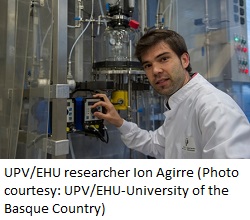 Chemicals found in wine could help uncork the potential in biodiesel. Researchers at the UPV/EHU-University of the Basque Country in Spain are looking into how acetals, chemical compounds found in many wines, can improve biodiesel’s properties.
Chemicals found in wine could help uncork the potential in biodiesel. Researchers at the UPV/EHU-University of the Basque Country in Spain are looking into how acetals, chemical compounds found in many wines, can improve biodiesel’s properties.
From the point of view of chemistry, acetals are obtained through the reaction of an alcohol and an aldehyde. They are generated naturally in fermentation processes. For example, in many wines like port, acetals are the indicators of quality because of the tremendously special, sweet smell they give the wine. When the liquid is poured from glasses into the fuel tank, the acetals improve the properties of the biodiesel when they mix with it: combustion is more effective and, what is more, it is less polluting because engine performance is increased. It is vitally important to come up with a method to obtain acetals easily and cheaply, as a litre of biodiesel may have an acetal content of about 15%.
It is easy to produce acetals in a laboratory, but designing an industrial-scale process is quite another matter, according to the UPV/EHU researcher Ion Agirre. He is trying to make this process possible with the help of his colleagues in the SUPREN group. He has experimented with the alcohol that is the by-product of sugar-rich plants (sugar cane, beetroot, etc.) and also with glycerol, both of which are alcohols of renewable origin. Glycerol is also an alcohol and is a by-product obtained from the reaction to produce the biodiesel. It is used, above all, in cosmetic creams and other products, but it is difficult to channel all the glycerol generated in biodiesel production to this use. That is why it would be advantageous to validate this compound in acetal production.
The researchers found that glycerol-based acetals transmit better properties to the biodiesel compared to alcohols such as ethanol or butanol. They hope to translate this knowledge to a commercial scale.

